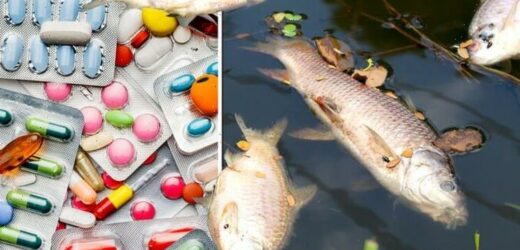Brexit: Fishing industry was 'sacrificed' by government says Deas
We use your sign-up to provide content in ways you’ve consented to and to improve our understanding of you. This may include adverts from us and 3rd parties based on our understanding. You can unsubscribe at any time. More info
The study looked at 258 rivers across the globe, including the Thames in London and the Amazon in Brazil, to measure the presence of 61 pharmaceuticals, such as carbamazepine, metformin and caffeine. The study, from scientists at the University of York, found that pharmaceutical pollution is contaminating water on every continent.
Speaking to Express.co.uk, Dr John Wilkinson warned that high concentrations of drug pollution in rivers could lead to a decrease in the population of fish.
He said: “There’s a chemical that’s called ethinylestradiol, which is in oral contraceptive pills, and its intended to prevent pregnancies in humans.
“The way that chemical works is very well conserved in other organisms, meaning that the chemical receptors that make that medicine work in humans also exist in fish for example.
“They’re very sensitive and in very small concentrations of this chemical, you can see effects in fish in a river.


“These fish can actually have their gender modified, in essence, have eggs growing in male reproductive tissue, as being exposed to certain levels of endocrine-disrupting compounds like oral contraceptive pills.”
Dr Wilkinson warned that in past decade or so, scientists have found that chemicals like this can affect the physiology in male fish in particular.
In such situations, the testes of the fish would begin to develop eggs in a similar way as seen in female fish.
He said: “The abundance of that sperm in the testes is massively reduced, which then reduces the organism’s ability to reproduce.

“What you can begin to see in extreme scenarios of persistent long term exposure to a chemical like this is that you can get changes in the ratios of the genders of fish living in the river as there are very few males.
“What we see is that this can actually damage the reproductive success as a whole community in the water.”
Fortunately, Dr Wilkinson reassured that such cases of fish stocks dying out are extremely rare at the moment.
He said: “We do see it in recent cases, even in the UK, but it’s unlikely to occur on a vast scale.
DON’T MISS:
Russia nuclear threat: Putin to launch missile TOMORROW [INSIGHT]
Pakistan and Russia strike gas deal as pair form ‘new world order’ [REVEAL]
Putin’s nuclear threat to UK: Nine locations that could be obliterated [MAPPED]

“Mostly because it needs to be at a certain concentration of this chemical before you can see effects.
“Where we see risk to fish in terms of population and physiological effects are in rivers that tend to be quite small and rivers that are dominated by sewage treatment affluent.”
Rich Quelch at pharmaceutical experts Origin warned against swimming in UK rivers that heavily polluted.
He said: “While levels found in the UK are unlikely to be toxic to humans, river water should never be treated as ‘clean’.

“Always have a shower shortly after being in contact with river water, avoid areas downstream of industrial sites or sewage overflows especially after rainfall, or nearby agricultural fields with cattle.
“Cover any cuts to avoid bacteria from entering your body and try not to swallow any water.
“Before choosing your spot, visit the Environment Agency’s website to check local water quality and The Rivers Trust which maps pollution incidents.”
Source: Read Full Article


